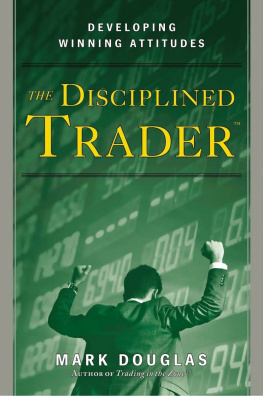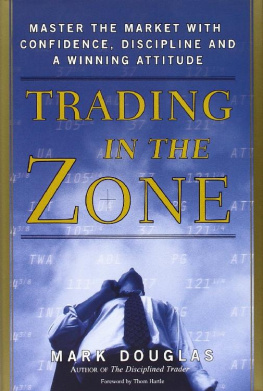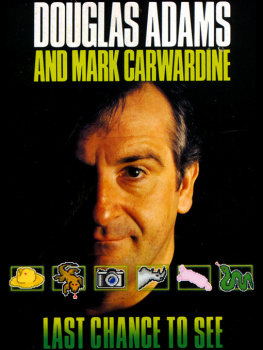Mark DOUGLAS - The Disciplined Trader: Developing Winning Attitudes
Here you can read online Mark DOUGLAS - The Disciplined Trader: Developing Winning Attitudes full text of the book (entire story) in english for free. Download pdf and epub, get meaning, cover and reviews about this ebook. year: 1990, publisher: Prentice Hall Press, genre: Religion. Description of the work, (preface) as well as reviews are available. Best literature library LitArk.com created for fans of good reading and offers a wide selection of genres:
Romance novel
Science fiction
Adventure
Detective
Science
History
Home and family
Prose
Art
Politics
Computer
Non-fiction
Religion
Business
Children
Humor
Choose a favorite category and find really read worthwhile books. Enjoy immersion in the world of imagination, feel the emotions of the characters or learn something new for yourself, make an fascinating discovery.
- Book:The Disciplined Trader: Developing Winning Attitudes
- Author:
- Publisher:Prentice Hall Press
- Genre:
- Year:1990
- Rating:4 / 5
- Favourites:Add to favourites
- Your mark:
- 80
- 1
- 2
- 3
- 4
- 5
The Disciplined Trader: Developing Winning Attitudes: summary, description and annotation
We offer to read an annotation, description, summary or preface (depends on what the author of the book "The Disciplined Trader: Developing Winning Attitudes" wrote himself). If you haven't found the necessary information about the book — write in the comments, we will try to find it.
The Disciplined Trader: Developing Winning Attitudes — read online for free the complete book (whole text) full work
Below is the text of the book, divided by pages. System saving the place of the last page read, allows you to conveniently read the book "The Disciplined Trader: Developing Winning Attitudes" online for free, without having to search again every time where you left off. Put a bookmark, and you can go to the page where you finished reading at any time.
Font size:
Interval:
Bookmark:
The Disciplined Trader is a comprehensive guide to understanding the psychology of self-discipline and personal transformation needed to become a successful stock or futures trader. This book will serve as a step-by-step guide to adapting successfully to the unusual psychological characteristics of the trading world.
I say "adapting" because most people venturing into the trading environment don't recognize it as being vastly different from the cultural environment in which they were brought up. Not recognizing these differences, they would have no way of knowing that many of the beliefs they acquired to enable them to function effectively in society will act as psychological barriers in the trading environment, making their success as traders extremely difficult to achieve. Reaching the level of success they desire as traders will require them to make at least some, if not many, changes in the ways they perceive market action.
Unlike other social environments, the trading arena has many characteristics requiring a very high degree of self-control and self-trust from the trader who intends to function successfully within it. However, many of us lack this self-control because as children we learned to function in a structured environment where our behavior was controlled by someone more powerful than ourselves, whose purpose was to manipulate our behavior to conform to society's expectations.
Thus, we were forced by external forces to behave in certain ways through a system of rewards and punishments. As a reward, we would be given the freedom to express ourselves in some desired manner. As a punishment, we would either be prevented from getting what we wanted, causing emotional pain, or we were inflicted with various forms of corporal punishment, causing physical pain. As a result, the only form of behavior control that we typically learned for ourselves was based on the threat of pain - either emotional or physical - from someone or something we perceived as having more power than ourselves. And since we were forced to relinquish our personal power to other people, we naturally developed many of our traditional resources for success (the particular ways in which we learned to get what we want) from the same mental framework. Accordingly, we learned that acquiring power to manipulate and force changes upon things outside of us was the only way to get what we wanted.
One thing you will learn as a trader is that the mental resources you use to get what you want in your everyday life will not work in the trading environment. The power and control that are necessary to manipulate the markets (make them do what you want them to do) are beyond all but a handful of individuals. And the external constraints that exist in society to control your behavior don't exist in the market environment. The markets have absolutely no power or control over you, no expectation of your behavior, and no regard for your welfare.
If, in fact, you can't control or manipulate the markets and the markets have absolutely no power or control over you, then the responsibility for what you perceive and for your resulting behavior resides only in you. The one thing you can control is yourself. As a trader, you have the power either to give yourself money or to give your money to other traders. And the ways in which you choose to do this will be determined by a number of psychological factors that have little or nothing to do with the markets. And this will be so until you acquire some new skills and also learn how to adapt yourself to suit conditions as they exist in the market environment.
To operate successfully in this environment you will need to learn how to control yourself in ways that may be completely alien to you.
You will also have to learn how to grant yourself the mental freedom to shift your perspective to notice alternative possibilities to getting what you want in the trading arena, regardless of your expectations of how you are going to get it. There are only a few traders who have come to the realization that they alone are completely responsible for the outcome of their actions. Even fewer are those who have accepted the psychological implications of that realization and know what to do about it.
Rarely do any of us grow up learning how to operate in an arena that allows for complete freedom of creative expression, with no external structure to restrict it in any way. In the trading environment, you will have to make up your own rules and then have the discipline to abide by them. The problem is, price movement is fluid, always in motion, quite unlike the highly structured events that most of us are accustomed to. In the market environment, the decisions that confront you are as endless as the price movements you intend to take advantage of. You don't just have to decide to participate, you also have to decide when to enter, how long to stay in, and under what conditions to get out. There is no beginning, middle, or end - only what you create in your own mind.
In addition to the negative psychological implications that accompany these decisions, you must be aware that even if you make the minimum financial commitment of one contract per trade (as in the futures market), there is an unlimited potential for profit as well as an unlimited potential for loss. From a psychological perspective, this means that each trade has the possibility of fulfilling your wildest dreams of financial independence, and simultaneously presents you with the risk of losing everything you own. The constantly changing price movement makes it extremely easy for you to ignore the risk and tempt yourself into believing you don't have to follow your own rules, this time.
Here is an environment that offers complete freedom of expression combined with unlimited possibilities and unlimited risk. If you place in it a participant who is oblivious to these psychological conditions (one who operates from a mental framework oriented toward external structure, constraints, and expectations), then what you have is a formula for emotional and financial disaster.
This grim scenario certainly explains why so few people ever make money as traders. Actually, almost all of those who make an attempt at trading completely underestimate the difficulty and consequently overestimate their ability to fulfill their inflated expectations. Therefore, most, if not all, people who trade inflict some degree of psychological damage upon themselves. I am defining "psychological damage" as any mental framework that has potential for generating fear.
Fear results from any belief about environmental conditions that has the potential to cause either physical or emotional pain such as stress, anxiety, confusion, disappointment, or betrayal. Painful emotional conditions are basically the result of unfulfilled expectations. Unfulfilled expectations create a conflict between a person's beliefs about the way things should be and the actual environmental conditions that don't match those beliefs. This conflict is expressed through our emotions in the form of pain that we generally label as stress, anxiety, confusion, and so on.
People seem to avoid pain instinctively by building up mental defenses against the intrusion of environmental information that would confirm the existence of any conflict. These defenses consist of denials, rationalizations, and justifications - all of which will result in perceptual distortion.
"Perceptual distortion" occurs when our mental system automatically distorts environmental information by shaping and selectively excluding certain information to compensate for the conflict between what we expect and what the environment is offering us. This will be done in such a way that we will believe a shared reality exists between ourselves and the outside environment, thus avoiding any pain. I am defining a "shared reality" as a correspondence between one's beliefs about the environment and the actual environmental conditions that exist.
Font size:
Interval:
Bookmark:
Similar books «The Disciplined Trader: Developing Winning Attitudes»
Look at similar books to The Disciplined Trader: Developing Winning Attitudes. We have selected literature similar in name and meaning in the hope of providing readers with more options to find new, interesting, not yet read works.
Discussion, reviews of the book The Disciplined Trader: Developing Winning Attitudes and just readers' own opinions. Leave your comments, write what you think about the work, its meaning or the main characters. Specify what exactly you liked and what you didn't like, and why you think so.









